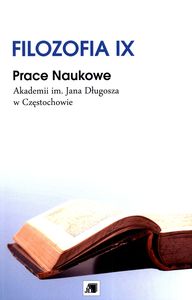Konstytucja przedmiotu filozoficznego na przykładzie fragmentów artykułu Hansa-Georga Gadamera "Uniwersalność problemu hermeneutycznego"
Constitution of a Philosophical Object on the Example of the Excerpts from H.-G. Gadamer’s Article: "The Universality of the Hermeneutical Problem"
Author(s): Andrzej ZalewskiSubject(s): Philosophy, Language and Literature Studies, History of Philosophy, Social Philosophy
Published by: Uniwersytet Jana Długosza w Częstochowie
Keywords: philosophical object; analysis of a philosophical text; Gadamer; logical division; przedmiot filozoficzny; analiza tekstu filozoficznego; Gadamer; podział logiczny
Summary/Abstract: This study is devoted to the analysis of some excerpts from the article by Hans-Georg Gadamer The Universality of the Hermeneutical Problem (1966). This analysis could roughly be called a linguistic-rhetorical one. Its basic idea is as follows: the standard analysis of a philosophical text is primarily interested in (resorting to the terminology of the French structuralism) the level of what is said (énoncé), i.e. a set of meanings provided by the text, and these meanings can then be, without too much effort, moved from one utterance to another. In this way, however, the act of saying itself (énonciation) is omitted – the act of saying here is nothing else but the structure and organization of the meanings in the text, their merging and dispersion provided by the linguistic raw material of expression. Indirectly they result from the idiosyncratic features of the style of an individual philosopher. In the first place, however, the reason for them is the requirements of the philosophical utterance as such, “aimed” at constituting the object with specified properties. A philosophical object is nothing but the result of some philosophical construction efforts in the field of a language. Thanks to them, we uncover a new dimension of a philosophical utterance. This movement of integrating and dispersing the meanings leading to the constitution of a peculiar philosophical object, shown in a particular example, is therefore the subject of this paper. Niniejsze studium poświęcone jest tego rodzaju analizie fragmentów artykułu Hansa-Georga Gadamera "Uniwersalność problemu hermeneutycznego" (1966), którą można by w przybliżeniu nazwać językowo-retoryczną. Jej zasadnicza idea wygląda następująco: standardowa analiza tekstu filozoficznego interesuje się głównie (uciekając się do terminologii francuskiego strukturalizmu) poziomem wypowiadanego (what is said, énoncé), tj. zespołem znaczeń przekazywanych przez tekst, które to znaczenia można następnie bez większych problemów przenosić z jednej wypowiedzi do drugiej. Pomija się jednak w ten sposób samo wypowiedzenie (the act of saying, énonciation) – w tym wypadku sposoby konstrukcji i organizacji znaczeń w tekście, ich scalania i rozpraszania się, umożliwione przez językowe tworzywo wypowiedzi. Pośrednio i w dalszej kolejności wynikają one z idiosynkratycznych cech stylu danego filozofa, w pierwszym rzędzie jednak dyktowane są wymogami samej wypowiedzi filozoficznej jako takiej, „dążącej” do ukonstytuowania przedmiotu o określonych właściwościach. Przedmiot filozoficzny jest właśnie wynikiem zabiegów konstrukcyjnych w sferze języka, dzięki nim zaś odsłaniamy nowy wymiar wypowiedzi filozoficznej: już nie emitenta znaczeń, lecz generatora swego własnego korelatu przedmiotowego. Ów ruch konstruowania znaczeń wiodący do wyłonienia się osobliwego przedmiotu filozoficznego, ukazany na drobnym przykładzie, jest więc tematem niniejszej pracy.
Journal: Prace Naukowe Akademii im. Jana Długosza w Częstochowie. Filozofia
- Issue Year: IX/2012
- Issue No: 9
- Page Range: 9-27
- Page Count: 19
- Language: Polish

